中考英语二轮专题复习语法 形容词变副词 课件(共39张PPT)
文档属性
| 名称 | 中考英语二轮专题复习语法 形容词变副词 课件(共39张PPT) |
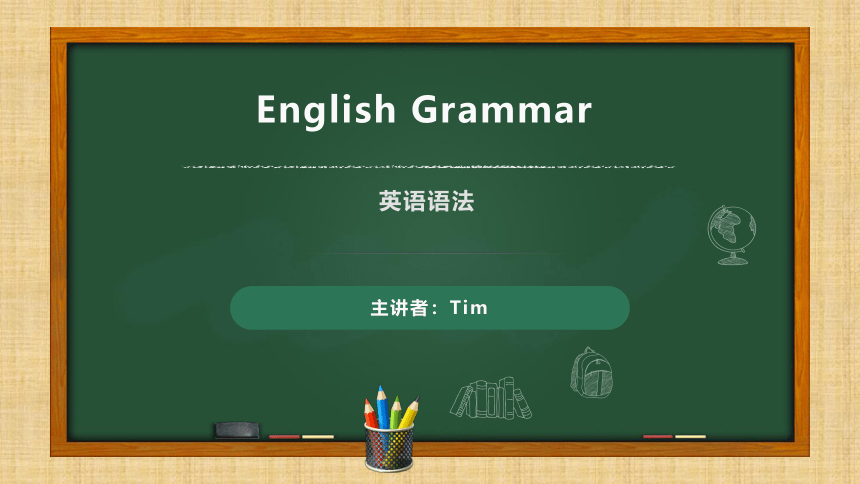
|
|
| 格式 | pptx | ||
| 文件大小 | 8.3MB | ||
| 资源类型 | 教案 | ||
| 版本资源 | 通用版 | ||
| 科目 | 英语 | ||
| 更新时间 | 2022-09-11 00:00:00 | ||
图片预览


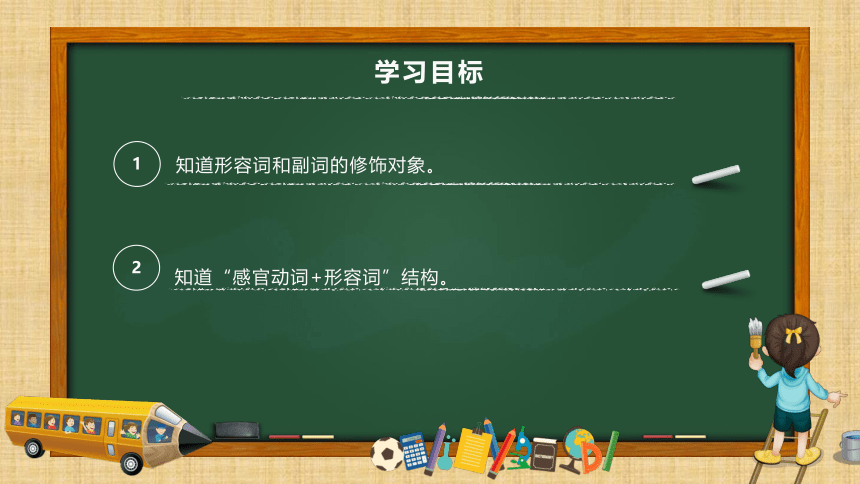
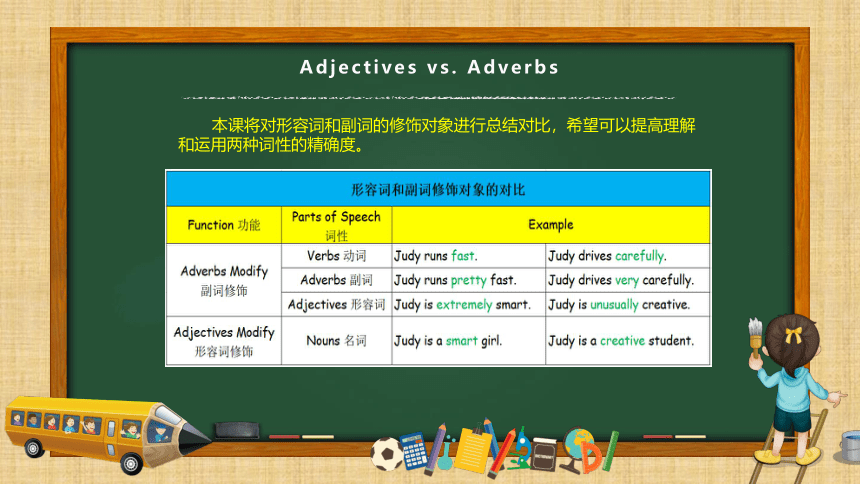
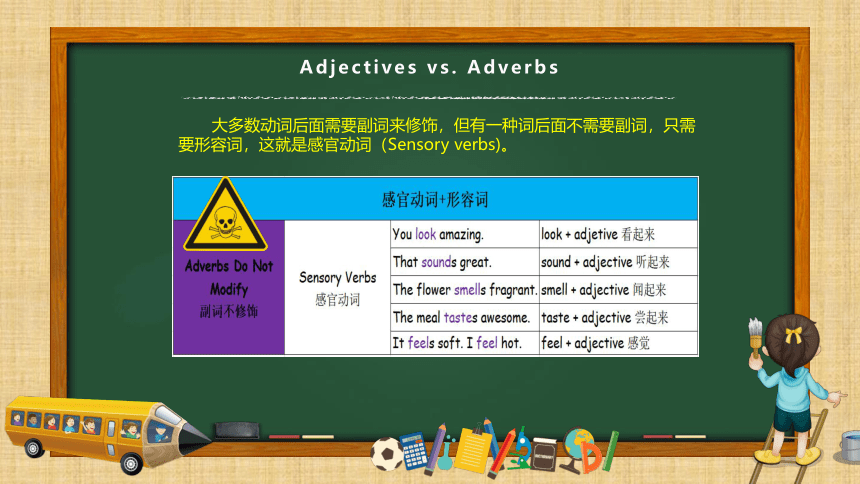

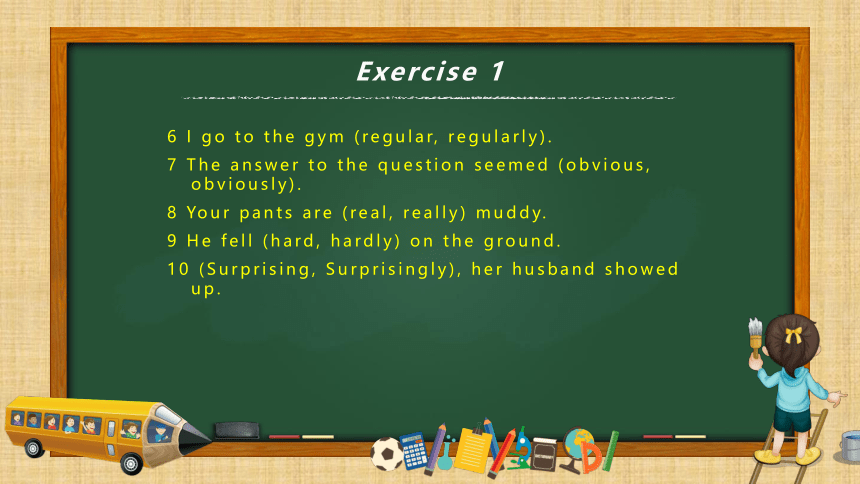
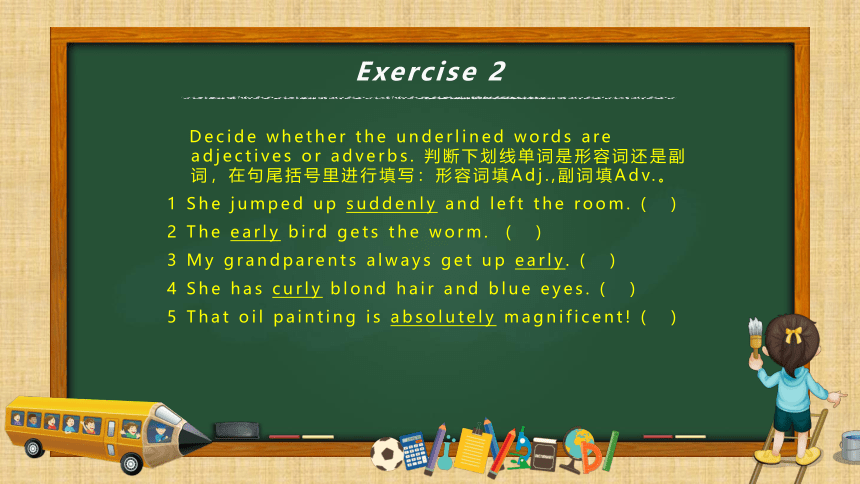
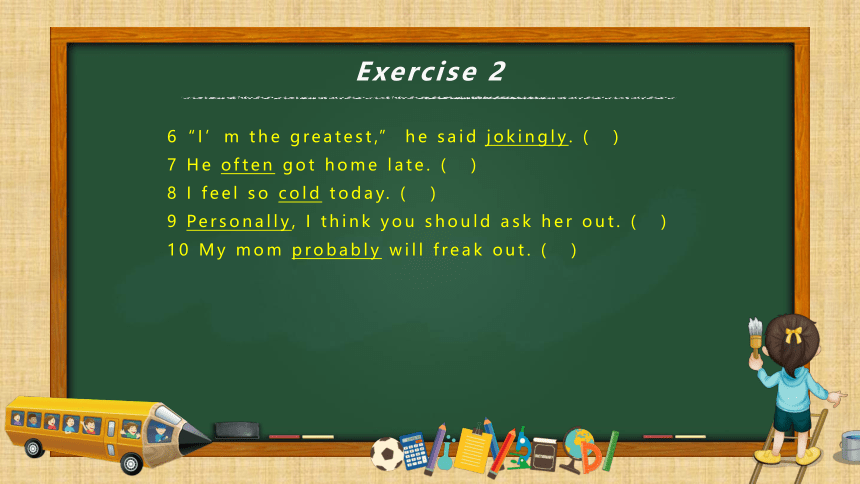
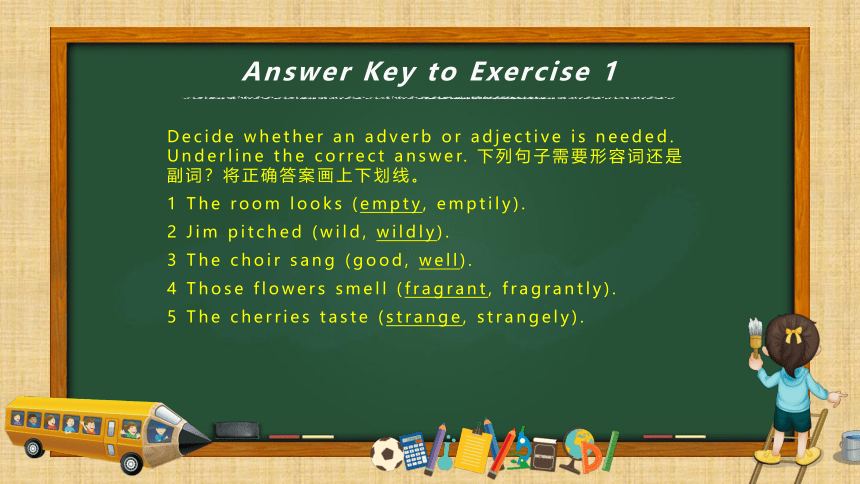
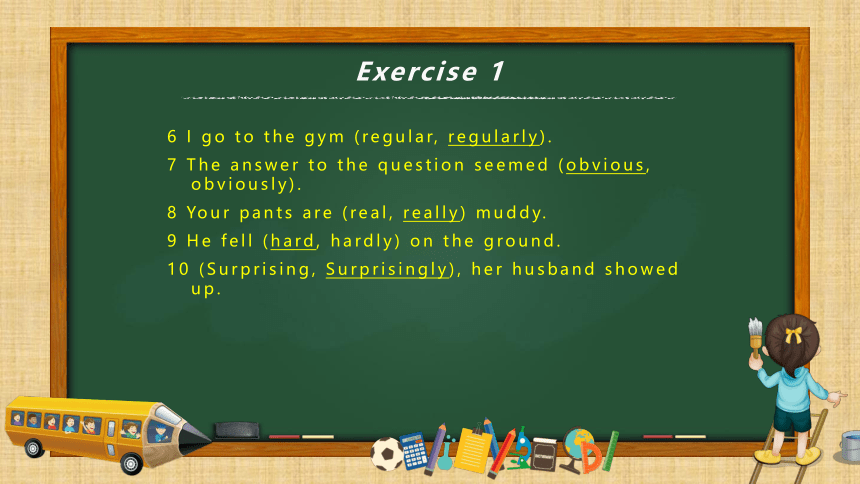
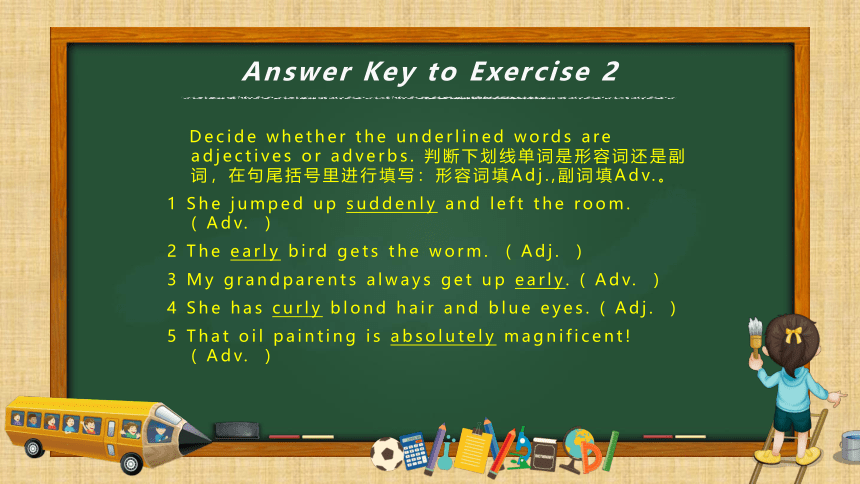
文档简介
(共39张PPT)
主讲者:Tim
英语语法
English Grammar
第13课 Adjectives vs. Adverbs 形容词vs.副词
第七章
Adverbs 副词
1
2
知道形容词和副词的修饰对象。
知道“感官动词+形容词”结构。
学习目标
Adjectives vs. Adverbs
本课将对形容词和副词的修饰对象进行总结对比,希望可以提高理解和运用两种词性的精确度。
Adjectives vs. Adverbs
大多数动词后面需要副词来修饰,但有一种词后面不需要副词,只需要形容词,这就是感官动词(Sensory verbs)。
Exercise 1
Decide whether an adverb or adjective is needed. Underline the correct answer. 下列句子需要形容词还是副词?将正确答案画上下划线。
1 The room looks (empty, emptily).
2 Jim pitched (wild, wildly).
3 The choir sang (good, well).
4 Those flowers smell (fragrant, fragrantly).
5 The cherries taste (strange, strangely).
Exercise 1
6 I go to the gym (regular, regularly).
7 The answer to the question seemed (obvious, obviously).
8 Your pants are (real, really) muddy.
9 He fell (hard, hardly) on the ground.
10 (Surprising, Surprisingly), her husband showed up.
Exercise 2
Decide whether the underlined words are adjectives or adverbs. 判断下划线单词是形容词还是副词,在句尾括号里进行填写:形容词填Adj.,副词填Adv.。
1 She jumped up suddenly and left the room. ( )
2 The early bird gets the worm. ( )
3 My grandparents always get up early. ( )
4 She has curly blond hair and blue eyes. ( )
5 That oil painting is absolutely magnificent! ( )
Exercise 2
6“I’m the greatest,” he said jokingly. ( )
7 He often got home late. ( )
8 I feel so cold today. ( )
9 Personally, I think you should ask her out. ( )
10 My mom probably will freak out. ( )
Answer Key to Exercise 1
Decide whether an adverb or adjective is needed. Underline the correct answer. 下列句子需要形容词还是副词?将正确答案画上下划线。
1 The room looks (empty, emptily).
2 Jim pitched (wild, wildly).
3 The choir sang (good, well).
4 Those flowers smell (fragrant, fragrantly).
5 The cherries taste (strange, strangely).
Exercise 1
6 I go to the gym (regular, regularly).
7 The answer to the question seemed (obvious, obviously).
8 Your pants are (real, really) muddy.
9 He fell (hard, hardly) on the ground.
10 (Surprising, Surprisingly), her husband showed up.
Answer Key to Exercise 2
Decide whether the underlined words are adjectives or adverbs. 判断下划线单词是形容词还是副词,在句尾括号里进行填写:形容词填Adj.,副词填Adv.。
1 She jumped up suddenly and left the room. ( Adv. )
2 The early bird gets the worm. ( Adj. )
3 My grandparents always get up early. ( Adv. )
4 She has curly blond hair and blue eyes. ( Adj. )
5 That oil painting is absolutely magnificent! ( Adv. )
Exercise 2
6“I’m the greatest,” he said jokingly. ( Adv. )
7 He often got home late. ( Adv. )
8 I feel so cold today. ( Adj. )
9 Personally, I think you should ask her out. ( Adv. )
10 My mom probably will freak out. ( Adv. )
主讲者:Tim
英语语法
English Grammar
第9课 From Adjectives to Adverbs 形容词变副词2
第七章
Adverbs 副词
1
2
知道形容词加后缀ly变成相应副词。
掌握形容词加后缀ly变成相应副词的规则。
学习目标
Adjective & Adverb
In most cases, an adverb is formed by adding -ly to an adjective.
多数情况下,一个形容词在词尾加ly即可变成相应的副词。
从中文的角度理解,形容词变成副词的过程就是把“……的”这样的词变成“……地”这样的词。
下面来看看形容词变副词的变化规则,注意与形容词变比较级的规则进行对比。
Adjective & Adverb
Adjective & Adverb
Adjective & Adverb
Exercise 1
Fill in the blanks with the respective adverbs. 写出下列形容词对应的副词。
1 slow ( )
2 bright ( )
3 active ( )
4 lucky ( )
5 angry ( )
Exercise 1
6 heavy ( )
7 probable ( )
8 gentle ( )
9 easy ( )
10 possible ( )
Exercise 2
Underline the adverbs in the following sentences. 将下列句子中的副词加下划线。
1 You’d better not talk loudly.
2 He’s considerably fatter than he used to be.
3 Hopefully she will come back.
4 I simply can’t do it.
5 She speaks English incredibly fast.
Answer Key to Exercise 1
Fill in the blanks with the respective adverbs. 写出下列形容词对应的副词。
1 slow ( slowly )
2 bright ( brightly )
3 active ( actively )
4 lucky ( luckily )
5 angry ( angrily )
Exercise 1
6 heavy ( heavily )
7 probable ( probably )
8 gentle ( gently )
9 easy ( easily )
10 possible ( possibly )
Answer Key to Exercise 2
Underline the adverbs in the following sentences. 将下列句子中的副词加下划线。
1 You’d better not talk loudly.
2 He’s considerably fatter than he used to be.
3 Hopefully she will come back.
4 I simply can’t do it.
5 She speaks English incredibly fast.
主讲者:Tim
英语语法
English Grammar
第10课 From Adjectives to Adverbs 形容词变副词3
第七章
Adverbs 副词
1
2
知道形容词通过in a… way结构变成相应副词。
掌握形容词通过in a… way结构变成相应副词的规则。
学习目标
Adjective & Adverb
Sometimes, an adverb can be formed by using the structure: in a + adjective + way.
有些时候,我们也可以使用in a +形容词+ way结构来构成对应的副词,字面意思就是“以……方式”,实际上这是回到了副词的原始定义:副词告诉我们某个动作是以何种方式进行。
He answered angrily. = He answered in an angry way.
He talked to me politely. = He talked to me in a polite way.
所以通常情况下,一个形容词变成它对应的副词有两条途径:直接在词尾+ly或使用in a …way结构。但是我们在第6章有一节课专门讲到词尾本身就是ly的形容词,这种如果采用直接在词尾加ly,那么就会变成lyly, 这不太符合英语平常的发音习惯,因为英语很少有某个词里面会出现连续两个相同的音节。于是,这种词我们就只能使用in a…way结构。以下是这种词的汇总,估计常用的的也就这几个,马上就可以掌握。
Adjective & Adverb
Exercise 1
Fill in the blanks with the respective adverbs. Use the structure “in a…way”. 使用“in a +形容词+way”结构变出下列形容词对应的副词。
1 angry ( )
2 friendly ( )
3 silly ( )
4 bad ( )
5 graceful ( )
Exercise 1
6 simple ( )
7 strange ( )
8 different ( )
9 hard ( )
10 polite ( )
Exercise 2
Rewrite the following sentences by replacing the adverbs with the “in a… way” structure. 仿照例句用in a …way结构替换句中的副词进行同义句转换。
Ex. He sat at the table quietly.
---He sat at the table in a quiet way.
1 They fixed the problem differently.
2 The stranger talked strangely.
Exercise 3
Fill in the blanks by using the adverbs with the “in a… way” structure. 把下列形容词变成“in a …way”结构的副词后填空。
graceful bad hard silly friendly
1 I have learned my lesson ( ).
2 Let’s deal with these people ( ).
3 The grumpy step-father treats his daughter ( ).
4 People are laughing. Stop acting ( ).
5 The lady danced ( ).
Answer Key to Exercise 1
Fill in the blanks with the respective adverbs. Use the structure “in a…way”. 使用“in a +形容词+way”结构变出下列形容词对应的副词。
1 angry ( in an angry way )
2 friendly ( in a friendly way )
3 silly ( in a silly way )
4 bad ( in a bad way )
5 graceful ( in a graceful way )
Exercise 1
6 simple ( in a simple way )
7 strange ( in a strange way )
8 different ( in a different way )
9 hard ( in a hard way )
10 polite ( in a polite way )
Answer Key to Exercise 2
Rewrite the following sentences by replacing the adverbs with the “in a… way” structure. 仿照例句用in a …way结构替换句中的副词进行同义句转换。
Ex. He sat at the table quietly.
---He sat at the table in a quiet way.
1 They fixed the problem differently.
They fixed the problem in a different way.
2 The stranger talked strangely.
The stranger talked in a strange way.
Answer Key to Exercise 3
Fill in the blanks by using the adverbs with the “in a… way” structure. 把下列形容词变成“in a …way”结构的副词后填空。
graceful bad hard silly friendly
1 I have learned my lesson ( in a hard way ).
2 Let’s deal with these people ( in a friendly way ).
3 The grumpy step-father treats his daughter ( in a bad way ).
4 People are laughing. Stop acting ( in a silly way ).
5 The lady danced ( in a graceful way ).
主讲者:Tim
英语语法
English Grammar
第13课 Adjectives vs. Adverbs 形容词vs.副词
第七章
Adverbs 副词
1
2
知道形容词和副词的修饰对象。
知道“感官动词+形容词”结构。
学习目标
Adjectives vs. Adverbs
本课将对形容词和副词的修饰对象进行总结对比,希望可以提高理解和运用两种词性的精确度。
Adjectives vs. Adverbs
大多数动词后面需要副词来修饰,但有一种词后面不需要副词,只需要形容词,这就是感官动词(Sensory verbs)。
Exercise 1
Decide whether an adverb or adjective is needed. Underline the correct answer. 下列句子需要形容词还是副词?将正确答案画上下划线。
1 The room looks (empty, emptily).
2 Jim pitched (wild, wildly).
3 The choir sang (good, well).
4 Those flowers smell (fragrant, fragrantly).
5 The cherries taste (strange, strangely).
Exercise 1
6 I go to the gym (regular, regularly).
7 The answer to the question seemed (obvious, obviously).
8 Your pants are (real, really) muddy.
9 He fell (hard, hardly) on the ground.
10 (Surprising, Surprisingly), her husband showed up.
Exercise 2
Decide whether the underlined words are adjectives or adverbs. 判断下划线单词是形容词还是副词,在句尾括号里进行填写:形容词填Adj.,副词填Adv.。
1 She jumped up suddenly and left the room. ( )
2 The early bird gets the worm. ( )
3 My grandparents always get up early. ( )
4 She has curly blond hair and blue eyes. ( )
5 That oil painting is absolutely magnificent! ( )
Exercise 2
6“I’m the greatest,” he said jokingly. ( )
7 He often got home late. ( )
8 I feel so cold today. ( )
9 Personally, I think you should ask her out. ( )
10 My mom probably will freak out. ( )
Answer Key to Exercise 1
Decide whether an adverb or adjective is needed. Underline the correct answer. 下列句子需要形容词还是副词?将正确答案画上下划线。
1 The room looks (empty, emptily).
2 Jim pitched (wild, wildly).
3 The choir sang (good, well).
4 Those flowers smell (fragrant, fragrantly).
5 The cherries taste (strange, strangely).
Exercise 1
6 I go to the gym (regular, regularly).
7 The answer to the question seemed (obvious, obviously).
8 Your pants are (real, really) muddy.
9 He fell (hard, hardly) on the ground.
10 (Surprising, Surprisingly), her husband showed up.
Answer Key to Exercise 2
Decide whether the underlined words are adjectives or adverbs. 判断下划线单词是形容词还是副词,在句尾括号里进行填写:形容词填Adj.,副词填Adv.。
1 She jumped up suddenly and left the room. ( Adv. )
2 The early bird gets the worm. ( Adj. )
3 My grandparents always get up early. ( Adv. )
4 She has curly blond hair and blue eyes. ( Adj. )
5 That oil painting is absolutely magnificent! ( Adv. )
Exercise 2
6“I’m the greatest,” he said jokingly. ( Adv. )
7 He often got home late. ( Adv. )
8 I feel so cold today. ( Adj. )
9 Personally, I think you should ask her out. ( Adv. )
10 My mom probably will freak out. ( Adv. )
主讲者:Tim
英语语法
English Grammar
第9课 From Adjectives to Adverbs 形容词变副词2
第七章
Adverbs 副词
1
2
知道形容词加后缀ly变成相应副词。
掌握形容词加后缀ly变成相应副词的规则。
学习目标
Adjective & Adverb
In most cases, an adverb is formed by adding -ly to an adjective.
多数情况下,一个形容词在词尾加ly即可变成相应的副词。
从中文的角度理解,形容词变成副词的过程就是把“……的”这样的词变成“……地”这样的词。
下面来看看形容词变副词的变化规则,注意与形容词变比较级的规则进行对比。
Adjective & Adverb
Adjective & Adverb
Adjective & Adverb
Exercise 1
Fill in the blanks with the respective adverbs. 写出下列形容词对应的副词。
1 slow ( )
2 bright ( )
3 active ( )
4 lucky ( )
5 angry ( )
Exercise 1
6 heavy ( )
7 probable ( )
8 gentle ( )
9 easy ( )
10 possible ( )
Exercise 2
Underline the adverbs in the following sentences. 将下列句子中的副词加下划线。
1 You’d better not talk loudly.
2 He’s considerably fatter than he used to be.
3 Hopefully she will come back.
4 I simply can’t do it.
5 She speaks English incredibly fast.
Answer Key to Exercise 1
Fill in the blanks with the respective adverbs. 写出下列形容词对应的副词。
1 slow ( slowly )
2 bright ( brightly )
3 active ( actively )
4 lucky ( luckily )
5 angry ( angrily )
Exercise 1
6 heavy ( heavily )
7 probable ( probably )
8 gentle ( gently )
9 easy ( easily )
10 possible ( possibly )
Answer Key to Exercise 2
Underline the adverbs in the following sentences. 将下列句子中的副词加下划线。
1 You’d better not talk loudly.
2 He’s considerably fatter than he used to be.
3 Hopefully she will come back.
4 I simply can’t do it.
5 She speaks English incredibly fast.
主讲者:Tim
英语语法
English Grammar
第10课 From Adjectives to Adverbs 形容词变副词3
第七章
Adverbs 副词
1
2
知道形容词通过in a… way结构变成相应副词。
掌握形容词通过in a… way结构变成相应副词的规则。
学习目标
Adjective & Adverb
Sometimes, an adverb can be formed by using the structure: in a + adjective + way.
有些时候,我们也可以使用in a +形容词+ way结构来构成对应的副词,字面意思就是“以……方式”,实际上这是回到了副词的原始定义:副词告诉我们某个动作是以何种方式进行。
He answered angrily. = He answered in an angry way.
He talked to me politely. = He talked to me in a polite way.
所以通常情况下,一个形容词变成它对应的副词有两条途径:直接在词尾+ly或使用in a …way结构。但是我们在第6章有一节课专门讲到词尾本身就是ly的形容词,这种如果采用直接在词尾加ly,那么就会变成lyly, 这不太符合英语平常的发音习惯,因为英语很少有某个词里面会出现连续两个相同的音节。于是,这种词我们就只能使用in a…way结构。以下是这种词的汇总,估计常用的的也就这几个,马上就可以掌握。
Adjective & Adverb
Exercise 1
Fill in the blanks with the respective adverbs. Use the structure “in a…way”. 使用“in a +形容词+way”结构变出下列形容词对应的副词。
1 angry ( )
2 friendly ( )
3 silly ( )
4 bad ( )
5 graceful ( )
Exercise 1
6 simple ( )
7 strange ( )
8 different ( )
9 hard ( )
10 polite ( )
Exercise 2
Rewrite the following sentences by replacing the adverbs with the “in a… way” structure. 仿照例句用in a …way结构替换句中的副词进行同义句转换。
Ex. He sat at the table quietly.
---He sat at the table in a quiet way.
1 They fixed the problem differently.
2 The stranger talked strangely.
Exercise 3
Fill in the blanks by using the adverbs with the “in a… way” structure. 把下列形容词变成“in a …way”结构的副词后填空。
graceful bad hard silly friendly
1 I have learned my lesson ( ).
2 Let’s deal with these people ( ).
3 The grumpy step-father treats his daughter ( ).
4 People are laughing. Stop acting ( ).
5 The lady danced ( ).
Answer Key to Exercise 1
Fill in the blanks with the respective adverbs. Use the structure “in a…way”. 使用“in a +形容词+way”结构变出下列形容词对应的副词。
1 angry ( in an angry way )
2 friendly ( in a friendly way )
3 silly ( in a silly way )
4 bad ( in a bad way )
5 graceful ( in a graceful way )
Exercise 1
6 simple ( in a simple way )
7 strange ( in a strange way )
8 different ( in a different way )
9 hard ( in a hard way )
10 polite ( in a polite way )
Answer Key to Exercise 2
Rewrite the following sentences by replacing the adverbs with the “in a… way” structure. 仿照例句用in a …way结构替换句中的副词进行同义句转换。
Ex. He sat at the table quietly.
---He sat at the table in a quiet way.
1 They fixed the problem differently.
They fixed the problem in a different way.
2 The stranger talked strangely.
The stranger talked in a strange way.
Answer Key to Exercise 3
Fill in the blanks by using the adverbs with the “in a… way” structure. 把下列形容词变成“in a …way”结构的副词后填空。
graceful bad hard silly friendly
1 I have learned my lesson ( in a hard way ).
2 Let’s deal with these people ( in a friendly way ).
3 The grumpy step-father treats his daughter ( in a bad way ).
4 People are laughing. Stop acting ( in a silly way ).
5 The lady danced ( in a graceful way ).
同课章节目录
- 词法
- 名词
- 动词和动词短语
- 动词语态
- 动词时态
- 助动词和情态动词
- 非谓语动词
- 冠词
- 代词
- 数词和量词
- 形容词副词及其比较等级
- 介词和介词短语
- 连词和感叹词
- 构词法
- 相似、相近词比较
- 句法
- 陈述句
- 一般疑问句和否定疑问句
- 特殊疑问句及选择疑问句
- 反意疑问句
- 存在句(There be句型)
- 宾语从句
- 定语从句
- 状语从句
- 主谓一致问题
- 简单句
- 并列句
- 复合句
- 主谓一致
- 主、表语从句
- 名词性从句
- 直接引语和间接引语
- 虚拟语气
- 感叹句
- 强调句
- 倒装句
- 祈使句
- 句子的成分
- 句子的分类
- 题型专区
- 单项选择部分
- 易错题
- 完形填空
- 阅读理解
- 词汇练习
- 听说训练
- 句型转换
- 补全对话
- 短文改错
- 翻译
- 书面表达
- 任务型阅读
- 语法填空
- 其他资料
